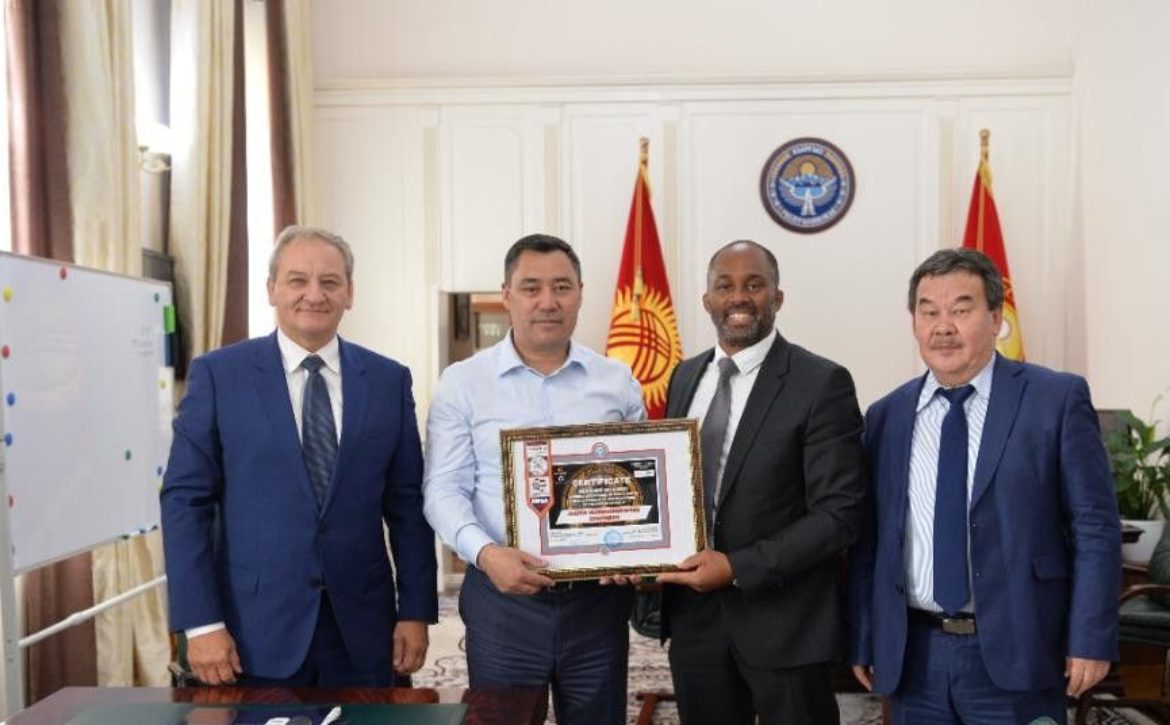
IMMAF strengthens ties with Kyrgyzstan’s populist president despite human rights concerns
IMMAF President Kerrith Brown presents Kyrgyzstan president Sadyr Japarov with a certificate appointing him Honorary President of the MMA Federation of Kyrgyzstan. | IMMAF
Karim Zidan delves into the IMMAF’s decision to appoint Kyrgyz president Sadyr Japarov as the Honorary President of the MMA Federation of Kyrgyzstan despite a range of human rights concerns. On August 27, 2021, Kerrith Brown, president of the International Mixed Martial Arts Federation (IMMAF) which serves as the global governing body for amateur MMA, visited Kyrgyzstan, where he met with the country’s president, Sadyr Japarov, to discuss the potential of growing the sport of MMA in the Central Asian country.
A nationalist who went from prisoner to the presidency less than a year ago, Japarov offered his support to IMMAF initiatives in the Central Asian country, saying “I was a sportsman myself, and I know how important it is to support an athlete at the right time of their journey.” Japarov also accepted the position of Honorary President of the MMA Federation of Kyrgyzstan. His certificate was presented by Brown and the newly elected president of the federation, Erkin Tentishev.
Brown also appeared on national television to discuss mixed martial arts’ development in Kyrgyzstan.
“This has been a really fruitful visit and it was a privilege and pleasure to receive an invitation to meet President Japarov,” Brown said following the meeting. “It was so clear that President Japarov clearly understood the importance that MMA could play in sport and social development in his country and gave his full support to the new President of our affiliated federation.
“On behalf of IMMAF I was delighted to see that the efforts of our member federation to focus on youth development of MMA is receiving the backing of the highest political authority.”
While the IMMAF’s newfound affiliation with Kyrgyzstan’s populist leader will certainly benefit the organization’s MMA local initiatives, it also raises concerns about the global body for mixed martial arts’ decision to partner with a controversial political leader plagued with human rights concerns.
From Prisoner to the Presidency
It was nearly midnight on January 10 when Sadyr Japarov began his victory speech following a landslide win in the presidential election held in his native Kyrgyzstan, a country that has seen three popular uprisings in the last 15 years.
Speaking from his campaign headquarters in the capital Bishkek, Japarov promised to rule the country with an open government free of corruption. “We will not repeat the mistakes of the previous government,” he said. “Over the past 30 years, corruption has taken root in our country in almost every area of our life – from now on, we will not tolerate such outrageousness.”
Japarov’s political career began in the weeks leading up to the 2005 Tulip Revolution, which led to the ouster of President Askar Akaev. He was elected as a member of the Supreme Council from the Tüp electoral district and was part of the parliamentary delegation that negotiated President Akaev’s resignation in 2005. Two years later, he turned down a position as a presidential advisor for then president Kurmanbek Bakiev but became the head of National Agency for the Prevention of Corruption in 2008 and held the position until 2010, when President Bakiyev was overthrown in the Second Kyrgyz Revolution.
Following the uprising, Japarov was once again elected as a member of the Supreme Council (this time for the Mekenchil (Patriot) party, which he is still a part of today) and from there became the chairman of the Committee on Judicial and Legal issues. In 2012, Japarov turned his attention to nationalization of Kumtör, the largest gold mine in Central Asia and a significant political topic in Kyrgyzstan. Japarov called for a demonstration in support of the nationalization of the mine, and what began as a peaceful protest turned into a riot where demonstrators stormed the nearby presidential and parliamentary building. Japarov was arrested for attempting to overthrow the government. He was found guilty and sentenced to 18 months in prison. He was later acquitted and released in June 2013.
Later that same month, protesters tried to kidnap a local official. The Kyrgyz authorities accused Japarov and protest leaders of hatching the plan. The protest leaders were detained, but Japarov, who claimed the charges were politically motivated, fled to Cyprus and lived in exile for several years. He returned in 2017 and was sentenced to 11 years and 6 months in prison. He remained in prison for nearly three years until he was freed by protestors during the October 2020 demonstrations against the results of the parliamentary elections. The High Court acquitted him in a speedy trial and he became the interim prime minister. Soon after, his supporters forced President Sooronbay Jeenbekov to resign and Japarov assumed the role of the country’s acting president.
Photo by Presidency of Kyrgyzstan / Handout/Anadolu Agency via Getty Images
Since being elected, Japarov’s government has promoted a political platform that contains both social-democratic elements, as well as populist rhetoric. He promised to expand the social security system, dramatically increase pensions, reduce bank interest rates, and create affordable housing for government employees. However, the more concerning part of Japarov’s program is the ongoing constitutional reform.
The revised constitution would grant more executive powers to the president, replacing the prime minister with a toraga who will serve as the head of the presidential administration, and downsizing parliament by 25 percent. The draft will be subject to a national referendum.
Beyond the constitutional reform, Japarov’s government has passed a series of concerning laws, including the Law on Protection from False and Inaccurate Information. According to Human Rights Watch, the “law empowers an unnamed “authorized state body” to shut down or block websites containing information deemed to be “false” or “inaccurate,” without a court order, on the basis of a complaint by either a private person or legal entity such as a company, who are the subject of the information.”
“The new ‘false information’ law poses a serious threat to free expression and media freedom in Kyrgyzstan, and would deeply mar the country’s human rights reputation,” said Syinat Sultanalieva, Central Asia researcher at Human Rights Watch. “It paves the way to state-managed censorship and runs counter to Kyrgyzstan’s national and international human rights obligations.”
Opposition figures in Kyrgyzstan have also complained of government surveillance targeting individuals critical of the current administration. And while the Interior Ministry claimed that any wiretapping it had done was carried out as part of an investigation into the political turmoil that resulted in the October 2020 protests, critics argued that it was a thinly veiled attempt to persecute dissent.
Courting Controversy
The IMMAF has long maintained partnerships with questionable governments.
Over the past few years, the international governing body has developed a working relationship with Bahrain’s Al Khalifa monarchy—a royal family whose reputation has been marred by longstanding accusations of human rights abuses dating back to the 2011 Arab Spring.
Between 2017-2019, the IMMAF hosted its annual flagship event, the World MMA Championships, in Manama, Bahrain. The 2019 edition of the tournament featured a total of 452 athletes competing from 51 nations, hosted by the Bahrain Mixed Martial Arts Federation under the Bahrain Olympic Committee. The event was the largest of its kind in the Middle East and was held under the patronage of Sheikh Khalid bin Hamad Al Khalifa, the fifth son of Bahraini ruler, King Hamad, and the honorary President of Bahrain Mixed Martial Arts Association.
The event also took place under the patronage of Sheikh Nasser bin Hamad Al Khalifa, Sheikh Khalid’s older brother and president of the Bahrain Olympic Federation. Sheikh Nasser, who gave a speech during the opening ceremony, is a far more controversial figure than his brother, as he was accused of torture among other human rights abuses during the 2011 uprising in Bahrain.
Photo by MAZEN MAHDI/AFP via Getty Images
Sheikh Nasser bin Hamad Al Khalifa
In the decade that followed the 2011 Arab Spring protests, Bahrain’s government has continued to oppress the vast majority of its population in an attempt to maintain power. Tactics such as the dissolution of political parties, passport confiscations, and torture, became common practice. In an attempt to gain legitimacy following their pivot to authoritarianism, Bahrain turned its attention to using hosting sports events as a form of soft power. To date, Bahrain has used the Formula-1 Grand Prix event, the Olympic Games, cycling, and MMA in its plans to cement legitimacy and enhance their image abroad.
However, despite Bahrain’s well-documented human rights abuses and worsening rights record, the IMMAF continued to work with the monarchy to host its flagship events. And when imprisoned Bahraini jiu jitsu and MMA champion Mohammed Mirza urged the IMMAF to reconsider its “future partnership” with Bahrain in a letter smuggled from prison, the organization instead opted to honor the Bahraini government by granting it the “Host Federation of the Year” award during the 2020 Amateur MMA Awards.
“As an international sports governing body, IMMAF’s mandate is to develop grassroots and amateur MMA and represent its participants worldwide,” Isobel Carnwath, Director of Brand and Communications at IMMAF, told BloodyElbow. “While IMMAF welcomes the support of its national federations by local authorities, it is beyond IMMAF’s remit to determine the sovereign leaders of nations and their politics.
“In accordance with the approach of the IOC, IMMAF believes in sport’s unifying capacity to overcome cultural barriers and to be a force for good. We are proud of IMMAF’s track record in, for example, enabling the first ever female MMA competitors in Bahrain and, this year, in facilitating the first-time state sponsorship of a Russian women’s MMA team. Our Women’s MMA Commission and Peace through MMA Commission are two examples of IMMAF initiatives to bring about positive social impact globally through our relationships in sport.”
While the aforementioned IMMAF’s initiatives do have a positive impact on the global MMA landscape, particularly when it comes to the development of women’s MMA, the organization’s willingness to partner with unsavory governments not only overshadows those positive advancements, but hinders the long-term goal of developing MMA without reliance on authoritarian regimes.
Read More


